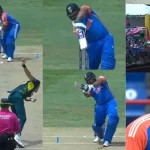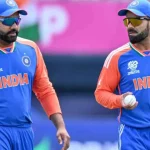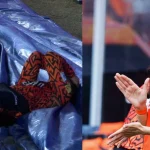In the aftermath of one of the deadliest terror attacks in recent memory in Jammu & Kashmir’s Pahalgam, where 26 innocent civilians lost their lives, emotions have spilled over across the country. Among those who have spoken out powerfully and with great anguish is former Indian cricketer Shreevats Goswami. The ex-wicketkeeper, known for his calm demeanor on the field, has made headlines with a passionate, uncompromising call to the BCCI: end all cricketing ties with Pakistan.
Goswami, who played domestic cricket for Bengal and represented India at the Under-19 level, including in the victorious 2008 World Cup campaign, took to social media platform X (formerly Twitter) to pour out his grief, rage, and moral plea. His message was clear, unfiltered, and carried the weight of a broken heart—one that still held memories of peace and hope witnessed firsthand in the very streets that are now bloodstained by terror.
“SAY NO TO CRICKET!” – A Cry from the Heart
In a sharply worded post that has since gone viral, Shreevats Goswami didn’t mince words:
“SAY NO TO CRICKET! And this is exactly why I say – you don’t play cricket with Pakistan. Not now. Not ever. When BCCI or the government refused to send India to the Champions Trophy in Pakistan, some had the audacity to say, ‘Oh, but sport should rise above politics.’ Really? Because from where I stand, murdering innocent Indians seems to be their national sport. And if that’s how they play – then it’s time we respond in a language they truly understand. Not with bats and balls. But with resolve. With dignity. With zero tolerance.”
Goswami’s statement resonated deeply with many Indians, cutting across the political and sporting spectrum. His stand wasn’t just about cricket—it was about a national conscience that has been bruised and bloodied one too many times. His post went beyond mere outrage. It was a personal, almost poetic mourning of a land he had walked recently, of people he had smiled with, and of a fragile peace that seemed, for a moment, possible.
Revisiting Kashmir: A Tale of Hope and Despair
What made Goswami’s message even more poignant was his emotional reflection on a recent visit to Kashmir. As part of the Legends League Cricket tournament held in the valley, Goswami had travelled to Pahalgam—a town now scarred by this latest act of violence.
“I’m furious. I’m devastated. Just a few months ago, I was in Kashmir for the Legends League – I walked through Pahalgam, met the locals, saw hope returning to their eyes. It felt like peace had finally found its way back. And now… this bloodshed again. It breaks something inside you.”
Goswami’s account paints a haunting contrast—of laughter and warmth replaced by gunfire and loss. His words recall not just the geography of Kashmir, but its emotional landscape. One where progress is fragile, and where every step forward seems haunted by the threat of regression.
A Larger Question: Can Sport Stay Isolated from Reality?
In the global conversation around sports diplomacy, cricket between India and Pakistan has long been seen as a double-edged sword. Some advocate it as a means to build bridges, while others, like Goswami, see it as an outdated ideal in the face of targeted terrorism.
India and Pakistan have not played a bilateral cricket series since 2012–13. All contests since then have been limited to multinational tournaments like the Asia Cup and ICC events. The BCCI, under successive administrations, has largely maintained a policy of non-engagement at the bilateral level due to national security concerns and diplomatic tensions. However, with the ICC Champions Trophy 2025 scheduled to be hosted in Pakistan, debates have reignited.
Goswami made it abundantly clear that from his perspective, there is no room left for nuance:
“This is not about being un-sporting. This is about being human. This is about drawing a line when the blood of your people is spilled, time and again. If they choose violence, we must choose clarity.”
The Impact of Goswami’s Statement
While active cricketers often avoid taking strong stances on geopolitics, retired and former players have occasionally stepped into this arena. Goswami’s voice, however, is unique—not just for its moral clarity but also for its timing.
Coming so soon after a major national tragedy, his statement has sparked intense discussion online and in cricketing circles. Hashtags like #NoCricketWithPakistan and #StandWithPahalgam began trending shortly after his post went live.
Supporters applauded him for speaking with courage while many public figures, including veterans of the Indian armed forces, echoed similar sentiments. Some critics, however, argued that isolating Pakistan in sport would do little to solve the core issues and might only harden positions on both sides.
Yet, the overwhelming majority seemed to appreciate that Goswami was not calling for war—he was calling for dignity.
The BCCI’s Dilemma: Between Sport and State
The Board of Control for Cricket in India (BCCI), although independent on paper, often aligns with the Ministry of External Affairs on matters involving Pakistan. With growing calls for a boycott of the 2025 Champions Trophy and rising pressure from fans and now former players like Goswami, the BCCI will face a tough road ahead.
Already, speculation is rife that India might refuse to travel to Pakistan for the tournament, potentially pushing the ICC to relocate the event or allow matches involving India to be held at a neutral venue. Goswami’s intervention could significantly strengthen the BCCI’s hand in negotiations.
It also raises questions for the ICC: how does it manage its calendar in a world where political realities and security threats increasingly influence cricketing engagements?
Sport Cannot Be a Spectator to Tragedy
Goswami’s central argument is not about punishing Pakistan’s cricket team. It’s about refusing to turn a blind eye to sustained acts of terror that originate across the border. It’s about acknowledging that silence can sometimes be complicity.
“It makes you question how many more times we’re expected to stay silent, stay ‘sporting,’ while our people die. No more. Not this time.”
This line perhaps best captures the sentiment not only of Goswami but of countless Indians trying to process the horror of the Pahalgam attack. For them, the cricket pitch is no longer neutral territory—it is a stage where choices matter. Where gestures speak louder than scores.
The Road Ahead: A Moment for Reflection
As emotions run high and India mourns yet another tragedy, Shreevats Goswami’s words offer both a challenge and an invitation.
A challenge to cricketing authorities to reevaluate their position, to draw strength from the pain of their people, and to act with principle.
An invitation to fellow cricketers—active or retired—to shed silence and join a conversation that is about more than just cricket. It’s about respect, loss, and national honor.
Whether or not the BCCI heeds Goswami’s appeal remains to be seen. But one thing is clear: sport, like society, cannot exist in isolation from reality. And sometimes, refusing to play is the strongest play of all.
Please check for information on the best betting sites in India – https://selectory.org/best-betting-sites/















